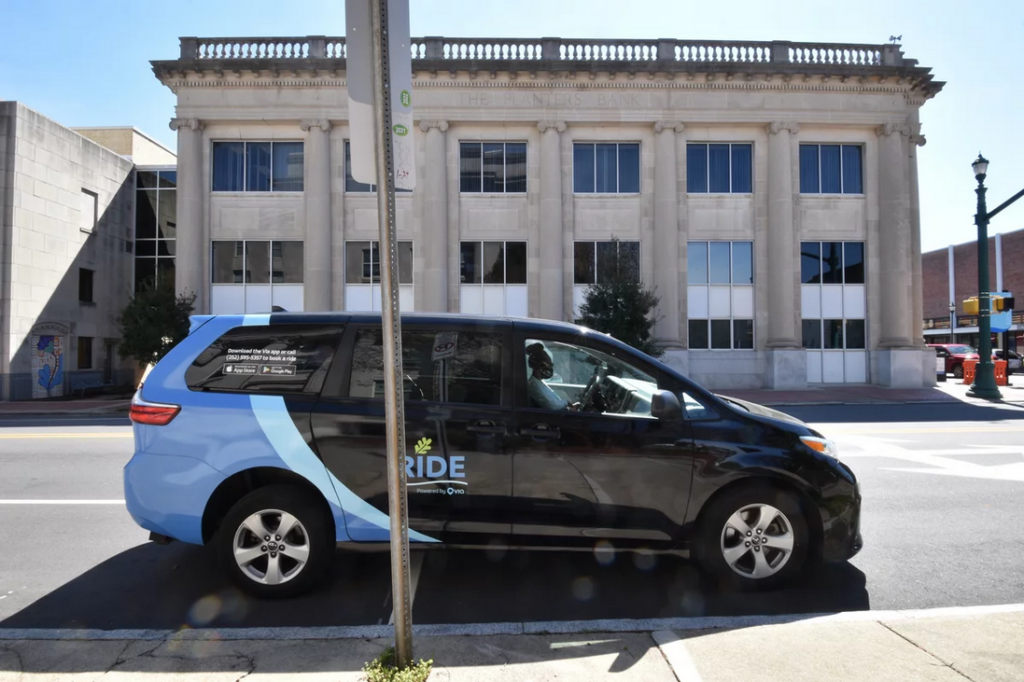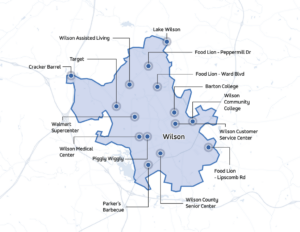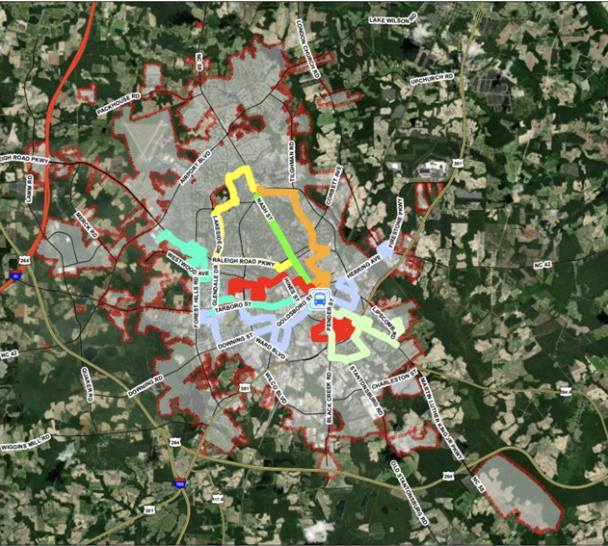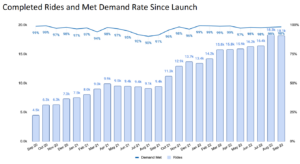Take a RIDE with Me: Highlighting the Adoption of Citywide Microtransit in Wilson, NC
20 minutes Date Launched/Enacted: Sep 1, 2020 Date Published: April 17, 2023

Brief Summary
- The City of Wilson launched RIDE in September 2020. RIDE is a citywide on-demand microtransit service that replaced the city’s limited fixed-route bus system.
- The City of Wilson earned an Accelerating Innovative Mobility grant from the Federal Transit Administration to support RIDE for part of its pilot period.
- Transit ridership tripled with RIDE compared to the fixed-route transit system, and about half of the trips on the microtransit system are commutes to or from work.
- The City of Wilson is looking to expand operations for RIDE so that it operates during all days of the week and at nighttime.

This pilot project is part of the Mobility Innovation Collaborative (MIC) program. The MIC program provides a comprehensive suite of technical assistance resources, promotes knowledge sharing activities, and captures stories and lessons learned from nearly 50 innovative mobility projects across the United States.
Description: Video interview with Rodger Lentz, Assistant City Manager at the City of Wilson.
Credit: Shared-Use Mobility Center (SUMC)
Introduction
Public transit services in American small and rural communities face various challenges today, including low population density, operator shortages, and limited or infrequent coverage. At the same time, these mobility services have become increasingly essential, especially for people who are aging, low-income, or experiencing disabilities. Problems like these demonstrate the need for transportation services to address mobility insecurity, a phenomenon where individuals lack access to adequate and reliable transportation. Wilson, a small city in eastern North Carolina, found itself navigating these exact challenges. With an underutilized bus system and high rates of poverty, the City of Wilson saw an opportunity to transition its fixed-route transit system into RIDE, an on-demand microtransit system. RIDE launched in September 2020 and, after successfully applying for an Accelerating Innovative Mobility (AIM) grant from the Federal Transit Administration, expanded its service hours both in the morning and evening.
History of Wilson RIDE
Situated in eastern North Carolina, Wilson is a low-income community of about 31 square miles whose residents are predominantly people of color (48% Black and 11% Hispanic). With just under 50,000 residents, 21.3% of the city’s population lives below the poverty line, compared to 13.7% across the state. [1] 11.6% of occupied housing units lack access to a vehicle compared to just 5.5% statewide, meaning that a larger proportion of residents depend on public transit or other transportation modes to address their needs. [2]
As a rural community, the City of Wilson operated a small six-route bus system until 2020 that only served about 40% of the city’s area, with headways up to an hour long. [3] Before the onset of the COVID-19 pandemic, ridership on the bus system averaged about 1,450 trips per week. Seeing a need to expand public transportation beyond a geographically constrained bus system, the Wilson City Council voted to replace the fixed-route system with a microtransit serving the entire city in June 2020. [4] Two months later, the Federal Transit Administration awarded the City of Wilson a $250,000 Accelerating Innovative Mobility (AIM) grant to support the transition. [5] On September 1, 2020, as life was deeply affected by the COVID-19 pandemic, the City of Wilson launched its newly minted on-demand microtransit service, calling it RIDE.
Program Operations
The premise of RIDE is simple: passengers can request shared van rides in real-time to and from anywhere within the boundaries of Wilson at a similar cost to riding a bus. Customers can book rides using the Via smartphone app, a Via-supported online portal, or a central dispatching phone line. Upon requesting their ride, customers are directed to meet the RIDE vehicle at a nearby location at an estimated pickup time. RIDE functions as a curb-to-curb service, meaning that the vehicles pick up and drop off customers within walking distance of their origins and destinations. The vans can carry up to four passengers at a time. RIDE operates from 5:30 AM to 7 PM during the work week and from 7 AM to 6 PM on Saturdays. Standard single-ride fares cost $2.50 plus $1 per additional rider in a passenger party. At first, the fare was just $1.50, but the City of Wilson increased the fare in mid-2022 due to high levels of demand, gas prices, and wages. Passengers under the age of 8 ride for free, and discounts are available for seniors and people with disabilities. Customers pay for their rides using the Via app; for those unbanked or without a credit card, the City of Wilson advises purchasing a pre-paid gift card, available at many retail stores throughout Wilson.

Description: A map of the Wilson RIDE service area with key destinations listed.
Click on image for full view.
Credit: City of Wilson
The City of Wilson procured Via as a turnkey service provider for RIDE. On top of serving as a booking, routing, and payment vendor, Via also oversees the staffing of drivers and the management of vehicles for RIDE. Drivers are directly employed through Via, and Via leases vehicles through VGM, a vendor that rents out vehicles for microtransit and ridehail services. Initially, Via partnered with a rental car company but transitioned to VGM due to supply and maintenance issues. Currently, the City of Wilson and Via have access to 20 vehicles for RIDE and have used up to 16 vehicles during periods of peak demand.
Program Goals and Outcomes
RIDE has seen a tremendous impact on how it serves Wilson residents. Going into the pandemic, the city’s fixed-route bus system averaged a ridership of about 1,450 rides per week. Ridership on RIDE has steadily increased since first starting; in early 2023, RIDE hit a weekly record of about 4,700 rides, more than tripling the use of fixed-route public transit across Wilson. RIDE has a goal wait time of up to 15 minutes after someone requests a pickup; due to demand, wait times have exceeded that sometimes and the service has adjusted its hours and vehicles in operation accordingly. The City of Wilson estimates that over half of the trips are for work commutes. [6] Notably, many customers are also low-income and have increasingly booked their rides using the smartphone app. When RIDE first launched, about 28% of customers requested their rides by phone. Now, only about 9% of customers use the phone to book their rides.
Budget and Planning
The City of Wilson has funded RIDE through different federal, state, and local sources, including:
- $250,000 from the Accelerating Innovative Mobility grant at the Federal Transit Administration;
- $2,000,000 of local funds through the American Rescue Plan Act (ARPA);
- $2,000,000 earmarked through federal omnibus legislation;
- CARES Act funding directed through the North Carolina Department of Transportation (NCDOT) and the North Carolina Department of Health and Human Services (NCHHS); and
- Funds through Section 5311(f) (also known as Formula Grants for Rural Grants) from the Federal Transit Administration, sourced through the NCDOT.
Many of these one-time grants, except the federal earmark, have been depleted, and the City of Wilson has explored ongoing funding sources to support the continued operations of RIDE. While the City of Wilson, NCDOT, and FTA can direct some funds to RIDE on an ongoing basis through traditional transit sources, staff at the City of Wilson and elsewhere in North Carolina have advocated the state’s legislature to increase support for microtransit in suburban and rural areas to ensure that these services are sustainable.
Marketing
RIDE was marketed through various traditional means, even though the microtransit service launched during the COVID-19 pandemic. The City of Wilson carried out various social media campaigns, posted laminated signs, and participated in interviews with local and regional newspapers to highlight RIDE. Riders have also received surveys through push notifications in the Via app. As a promotion, the City of Wilson also offered ten free first rides to customers when the microtransit service began operations. Riders were also invited to complete surveys through push notifications from the Via app.
RIDE has been widely commended for its impacts. In late 2020, the American Association of State Highway and Transportation Officials (AASHTO) recognized RIDE through its Innovation Initiative. [7] In August 2021, the Southeastern Association of State Highway and Transportation Officials (SASHTO) gave RIDE America’s Transportation Award for Best Use of Innovation and Technology. [8] Wilson’s RIDE program won the American Planning Association’s 2021 APA-NC Advancing Equity Award. [9] NPR reported Wilson RIDE in a feature article discussing how microtransit can improve mobility choices in low-density areas. [10] RIDE is widely seen as a leading microtransit effort in the United States for how the program has been deployed and how it serves residents in Wilson. Employees at the City of Wilson have spoken about RIDE at various industry conferences, most recently at the South Carolina Rural Summit in March 2023.
Equity
Officials at the City of Wilson have found that RIDE is reaching community members in a way that its fixed-route system could not. Not only has overall ridership on public transit increased, but community members most in need of expanded mobility choices are using the service. As a result, RIDE appears to address equity concerns in Wilson’s transportation environment. In a 2022 survey of 91 RIDE customers, the City of Wilson found that:
- 57% of the respondents have annual incomes below $25,000;
- 73% of the respondents are women;
- 80% of the respondents identify as people of color; and
- 86% of the respondents do not have access to a personal vehicle. [11]
In separate data collections and correspondences with RIDE customers, the City of Wilson has also learned that about half of the trips completed on the microtransit service are for work commutes. [12] Statistics like these demonstrate that RIDE is reducing mobility insecurity for customers and that this service is meeting a community need.
Challenges and Lessons Learned
The City of Wilson has navigated various challenges for RIDE, including:
- Maintenance and supply issues with their vehicles. At points, the City of Wilson found that vehicles for RIDE were in short supply or needed repair. Since Via is a turnkey partner for RIDE, it contracted with a large car rental company to provide and maintain the vehicles. The City of Wilson’s contract with Via created a clear line of communication between the two parties, allowing staff at the City of Wilson to express their concerns about the vehicles. Partway into the pilot, Via transitioned its vehicle supplier to Buggy, a service that specializes in car rentals for ridehail services. Soon after, VGM acquired Buggy as a new subsidiary.
- Providing access to customers who are unbanked, underbanked, or do not own a smartphone. Many people most in need of shared mobility services are low-income and do not own the technologies needed to use microtransit and pay fares. The City of Wilson owns a publicly owned broadband service, Greenlight, and used its outreach efforts to encourage users to purchase pre-paid debit cards to pay for fares and inform them that they could reserve rides by phone. Unbanked customers can also go to the Greenlight customer service center to add cash balances to their Wilson RIDE account in addition to being able to pay their utility bills.
- Securing a permanent funding stream and managing costs. The City of Wilson secured various one-time grants, including the AIM grant, COVID-19-pandemic-related stimulus dollars, and earmark funding. Now, the City of Wilson hopes that the North Carolina Department of Transportation and the Federal Transit Administration will support RIDE and other microtransit services on an ongoing basis, ensuring that RIDE continues to operate. The City of Wilson expects additional costs as ridership on RIDE is expected to increase; as a result, the City of Wilson hopes that future funding is correlated to ridership-related costs.
Future Plans
The City of Wilson is clear that RIDE is here to stay. Now that microtransit is a fixture in Wilson, staff and policymakers are focused on improving the service. Currently, the City of Wilson is considering expanding RIDE’s operating time to Sundays and nighttime shifts, helping customers working third shifts or running errands. Staff at the City of Wilson are collaborating with other city and state employees to advocate for the broader adoption of microtransit across North Carolina. In the future, the City of Wilson hopes that the State of North Carolina funds and assists with implementing microtransit in other suburban and rural communities, creating a solid transit ecosystem sensitive to the needs of low-density areas.
Conclusion
RIDE is widely considered a standard bearer for microtransit in the United States. Transit ridership in Wilson tripled, and now, the City of Wilson is looking to expand RIDE to serve people every day of the week at more times. Microtransit has grown, with several pilots and new programs deploying across North Carolina and elsewhere. While RIDE has been successful, the City of Wilson wants to be clear that this was the case because of Wilson’s geographic context as a small, low-income, rural community. Agencies must determine if microtransit is an appropriate solution for their communities when looking to expand shared mobility.
Key Considerations for Implementing Microtransit:
- What mobility services exist in your community at this time? How do they serve or not serve residents and visitors in your community?
- How will this microtransit service exist in relation to other mobility services, like fixed-route transit? Will the microtransit service replace fixed-route transit, operate in a targeted area like a business district, or operate as a first-/last-mile service?
- Will microtransit be a cost-effective solution for your community? Will it serve community members better than fixed-route transit?
- Will you partner with a vendor that offers a turnkey solution to your microtransit service, or will your agency manage certain aspects of the service, like drivers and staffing, software, or vehicles? Turnkey partnerships have positive and negative aspects compared to agency-operated mobility services.
- When will the microtransit service operate? Will it operate only during the work week or all days of the week? Will it operate only during rush hours when most people commute, or will it operate throughout the day and nighttime?
- How many vehicles will support your microtransit service? What types of vehicles will be in your fleet? Vehicle fleets might include cutaway buses, vans, minivans, or even smaller vehicles.
- How will your microtransit service serve low-income, unbanked, and/or underbanked people? How will you facilitate and market alternative booking and payment solutions?
- Who do you hope to serve with your microtransit service? Existing transit customers? Or do you hope to grow your customer base and increase ridership of publicly provided or supported mobility services?
- How will your agency manage variant costs? Unlike fixed-route transit services, the costs of operating microtransit are correlated with ridership. If ridership grows, how will your agency pay for additional drivers, insurance, and vehicles?
References
- US Census Bureau: American Community Survey 5-year estimates. https://censusreporter.org/profiles/16000US3774540-wilson-nc/. Accessed March 21, 2023.
- US Census Bureau: 2021 ACS 5-year estimates data profiles. https://data.census.gov/table?g=040XX00US37_160XX00US3774540&tid=ACSDP5Y2021.DP04. Accessed March 22, 2023.
- Transportation Research Board: ‘TRB Webinar: Microtransit–Innovation in Rural Mobility’, published November 2022. https://onlinepubs.trb.org/onlinepubs/webinars/221020.pdf, page 24.
- City of Wilson: ‘New Transit Service Starts September 1’, published August 26, 2020. https://www.wilsonnc.org/Home/Components/News/News/315/16.
- Federal Transit Administration: ‘FY20 Accelerating Innovative Mobility (AIM) Project Selections’, published October 22, 2021. https://www.transit.dot.gov/research-innovation/fy20-accelerating-innovative-mobility-aim-project-selections.
- NPR: ‘This Small City Ditched Its Buses. Its Public Uber-Like Service Has Been a Big Hit’, published July 19, 2022. https://www.npr.org/2022/07/19/1111765630/on-demand-shuttles-have-replaced-buses-in-a-small-north-carolina-town.
- North Carolina Department of Transportation: ‘Wilson Microtransit Program Recognized Nationally as a Focus Technology’, published December 4, 2020. https://www.ncdot.gov/news/press-releases/Pages/2020/2020-12-04-wilson-microtransit-project.aspx.
- North Carolina Department of Transportation: ‘Wilson RIDE Program Wins Regional Transportation Award’, published April 17, 2021. https://www.ncdot.gov/news/press-releases/Pages/2021/2021-08-17-ride-program-regional-award.aspx.
- American Planning Association, North Carolina Chapter: ‘2021 APA-NC Awards’. https://northcarolina.planning.org/community-outreach/past-award-winners/2021-award-winners/. Accessed March 22, 2023.
- NPR: ‘This Small City Ditched Its Buses. Its Public Uber-Like Service Has Been a Big Hit’, published July 19, 2022. https://www.npr.org/2022/07/19/1111765630/on-demand-shuttles-have-replaced-buses-in-a-small-north-carolina-town.
- Transportation Research Board: ‘TRB Webinar: Microtransit–Innovation in Rural Mobility’, published November 2022. https://onlinepubs.trb.org/onlinepubs/webinars/221020.pdf, page 28.
- NPR: ‘This Small City Ditched Its Buses. Its Public Uber-Like Service Has Been a Big Hit’, published July 19, 2022. https://www.npr.org/2022/07/19/1111765630/on-demand-shuttles-have-replaced-buses-in-a-small-north-carolina-town.

